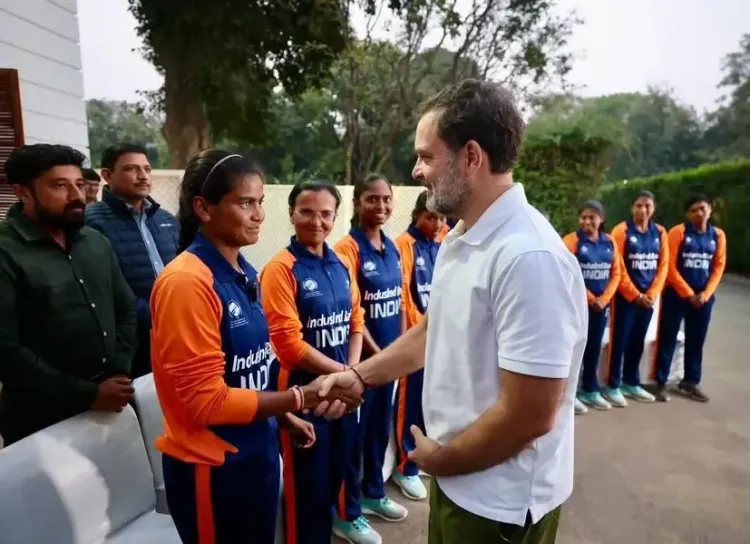How is India Celebrating the Champions of Blind Women’s T20 World Cup?

Synopsis
Key Takeaways
- Historic Victory: Indian blind women’s cricket team wins the inaugural T20 World Cup.
- Unbeaten Record: The team showcased exceptional performance throughout the tournament.
- Inspiration: Their journey inspires many and highlights the importance of inclusivity in sports.
- Future Growth: This win paves the way for greater recognition of blind cricket in India.
- Leadership Recognition: Rahul Gandhi’s support emphasizes the significance of this achievement.
New Delhi, Nov 26 (NationPress) The Leader of the Opposition in the Lok Sabha, Rahul Gandhi, welcomed the Indian blind women’s cricket team, who are the proud champions of the inaugural T20 World Cup, at 10 Janpath, New Delhi, on Wednesday. The Indian team made history by clinching the first-ever Blind Women's T20 World Cup in Sri Lanka, triumphing over Nepal by seven wickets in the championship match.
"Today, I had the privilege of hosting the Indian Blind Women’s Cricket Team, the victorious champions of the inaugural T20 World Cup, here in New Delhi. Their groundbreaking victory sends a powerful message of courage and potential. Their resilience, dedication, and remarkable spirit serve as an inspiration for the entire nation. India takes immense pride in these champions," posted Rahul Gandhi on Facebook.
The team's remarkable success represents a flawless campaign, with India remaining unbeaten throughout the tournament, showcasing total dominance.
After winning the toss, India chose to field first, limiting Nepal to 114 for 5 in their allotted 20 overs. The pursuit was executed with precision, as India achieved the target in just 12.1 overs, finishing with 47 balls remaining. Khula Sharir stood out, scoring an impressive 44 runs off 27 balls, including four boundaries, to lead India to a comfortable win.
In the semifinal, India secured a commanding nine-wicket victory against Australia, while Nepal reached the finals after narrowly defeating Pakistan in the other semifinal clash.
During their title run, India overcame Sri Lanka by 10 wickets, Australia by 209 runs, Nepal by 85 runs, the United States by 10 wickets, and Pakistan by eight wickets in the group phase, advancing to the semifinal where they bested Australia by nine wickets before ultimately defeating Nepal by seven wickets in the final.
India’s impressive title journey not only underscores their consistency but also signifies a monumental milestone for blind cricket, paving the way for greater recognition and growth of the sport in the future.









